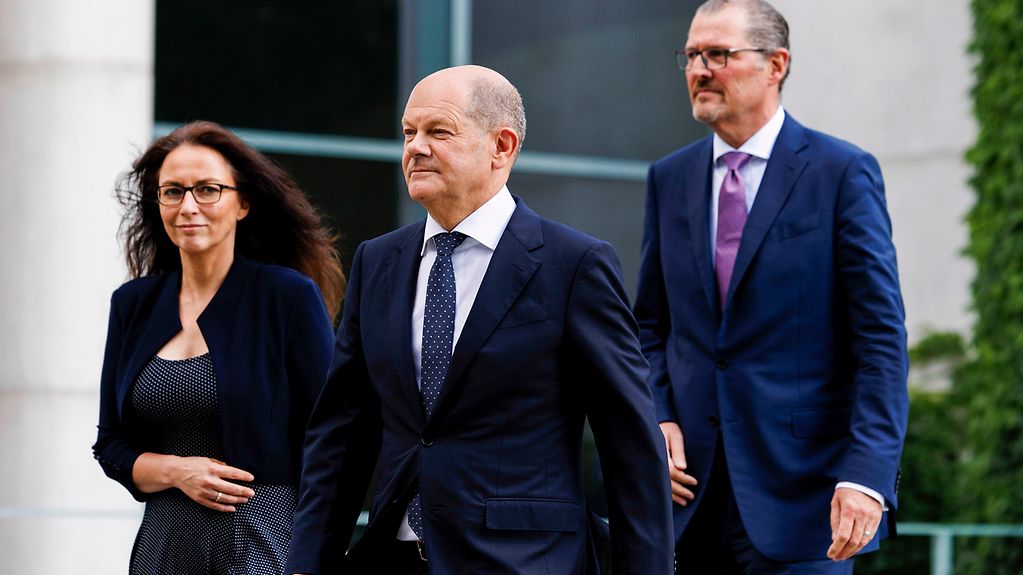Concerted Action at the Chancellery to fight high prices
“We’re standing together, and we want every citizen to get through this period well.” This was the Federal Chancellor Scholz's message following the first meeting of the “Concerted Action” group. The talks involved trades union, business, academic experts and politicians, and Scholz stated their aim was to mitigate the effects of high inflation and loss of earnings.
4 min reading time

“The only way we as a country can come through this crisis well is if we join forces and agree on solutions together,” said Federal Chancellor Scholz.
Photo: Federal Government/Koall
On Monday Federal Chancellor Scholz met trades union leaders and the heads of employers’ associations for the first meeting of the “Concerted Action” group. They will work together to find solutions to relieve the pressures of rising prices caused by Russia’s war against Ukraine.
“Our society is strong”
Russia’s war of aggression against Ukraine had changed everything, Scholz said. Sharp price rises due to the war and ongoing disruptions to supply chains are a serious social and economic problem. High prices for energy and food are hitting many people hard, and many have serious concerns about how to cope. The Federal Chancellor warned that the situation was not likely to change in the foreseeable future – something that everyone would have to prepare themselves for.
Yet at the same time he stressed that, “Our society is strong – much stronger than is sometimes claimed to be the case. What defines our country is a fair balance of interests and team spirit. Now we must maintain and strengthen this spirit.”
Working together to overcome historical challenges
“Today we took the first step in our “Concerted Action” so as to take on a shared responsibility: trades union, associations, the Bundesbank, academic experts and government.” The aim is to mitigate the effects of lost income and to avert the risk of an inflationary spiral. Scholz explained that the priority for the coming weeks would be to develop the right tools and find ways of responding to these historic challenges. “Because the only way we as a country can come through this crisis well is if we join forces and agree on solutions together,” he said.
The Federal Chancellor thanked the social partners for supporting this initiative. “What matters to me is this message: we’re standing together, and we want every citizen to get through this period well. Be they schoolchildren or pensioners, businesses or employees,” said the Federal Chancellor.
In June, consumer prices were 7.6 percent above the level of the same month last year, having reached 7.9 percent in May. As such, citizens are faced with high levels of inflation that puts pressure on their purchasing power.
Relief packages already kicking in
The Federal Government has put together two relief packages worth 30 billion euros which will mitigate the effects of the sharp increases in energy prices this year. Scholz said that the main issue here was a total increase in electricity bills of nearly 20 billion euros. “This takes the pressure off many people – families and business – and it’s right that we’re doing it,” he said.
The Federal Chancellor drew attention to the numerous measures coming into effect now or very soon, such as the increased basic personal allowance for income tax. He also noted the 200 euro one-off payment for recipients of social security, the 100 euro child bonus, the abolition of the EEG levy on 01 July, increased heating subsidies for recipients of housing benefits and the one-off energy price lump sum of 300 euros in September. He noted that the fuel discount and 9-euro ticket were already in effect.
At the same time, the Federal Government is doing all it can to ensure that energy supplies continue to function.
Social partners take responsibility
The heads of the German Trade Union Confederation (DGB), Yasmin Fahimi, and the President of the Confederation of German Employers' Associations (BDA), Rainer Dulger, welcomed the start of the “Concerted Action”. Famihi stressed the need for joint efforts, and praised how today’s meeting had contributed to maintaining peace in society. “We can only tackle this crisis together,” Dulger added.
DGB President Fahimi expressed her approval that Federal Government relief packages were beginning to make a difference for citizens. “A household on average wages will receive relief worth around 1,000 euros,” Fahimi said. This was an “appreciable sum,” she said, adding that “it was certainly helpful.” Fahimi said this relief was necessary “in support of and in addition to what we must take responsibility for as parties to collective agreements.”
Wages are not driving inflation
DGB head Fahimi and BDA president Dulger stressed that there was currently no wage-price spiral. Dulger emphasised that wages are not currently driving inflation.
He said that what mattered now was finding ways of tackling high energy costs for private households and businesses alike. Energy taxes and network fees could offer leverage in that regard, Dulger said.
Fahimi stressed that the key priority must be to prevent a recession while stabilising workplaces, maintaining value creation chains and ensuring employment. Dulger warned that continuous economic growth could no longer be taken for granted, and that businesses and their workforces were facing major challenges. He stressed that employers saw it as their responsibility to maintain stability in the economy and employment market.
Negotiating wage rises was solely a matter for parties to collective agreements, he said. Nevertheless, Dulger noted that politicians could also ensure that more of people’s wages stayed in their wallets. The Confederation of German Employers’ Associations proposed an end to bracket creep as a means of achieving “more net from gross”. He also noted that exemptions from one-off payments, taxes and social security contributions were an option. However, whether or not the tariff partners would take up this option was down to them, he said.